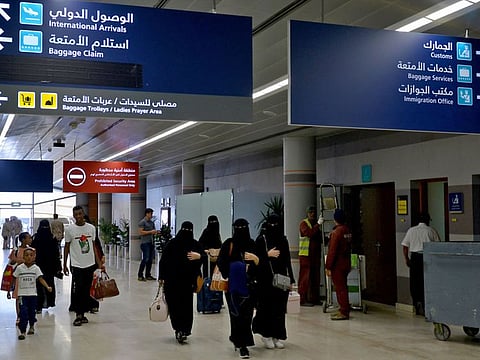A giant leap for Saudi women
Decision to allow women to travel without male guardian’s approval is a progressive step

Fifty years ago, Neil Armstrong, an astronaut aboard the US space rocket Apollo 11 uttered those iconic words — “...one small step for a man, one giant leap for mankind” — as he first stepped on the moon. It was a defining moment for the world as another distant frontier, the moon, had been breached. This gave many the hope and aspiration of more challenges to overcome, and not just in the field of conquering space.
In Saudi Arabia, we have had our defining moment a few days ago when King Salman Bin Abdul Aziz signed into law a proposal forwarded by the cabinet to do away with the need of adult Saudi women seeking permission to get a passport through the approval of their male guardians.
It is obviously not as grand as conquering the moon, but ask any Saudi woman and she will tell you that it feels no less.
Transforming the country
The law distinctly gives the woman more rights than before, a trend that has been put into effect since the Saudi crown prince began a series of moves through his grand vision of transforming the country from near-medieval times and bringing it up to par with the 21st century.
Saudi Arabia, it must be explained, was a country which had been held hostage by a severe strain of religious extremism that sprouted strongly right after the siege on the Grand Mosque in Makkah back in 1979.
Entertainment, films, women driving, women working without gender segregation laws has really opened many doors in this country for a better future.Tariq A. Al Maeena, Saudi socio-political commentator
The storming of the Great Mosque by a group of 200 to 300 young men led by Juhayman Al Otaibi and the subsequent siege, which lasted for two week and hundreds were killed as a result was an early warning sign that religious extremism was taking a foothold in the country. Members of Saudi Arabia’s hardline Islamist community were being extremely disturbed by signs of increasing liberalisation following the oil boom and the influx of petrodollars.
A peculiar series of events
Juhayman, a corporal in the Saudi armed forces encourage by the revolution in neighbouring Iran, which saw a progressive if ruthless leader, the Shah, deposed by a religious cleric earlier in the year harboured similar visions for himself as he set about recruiting others with similar hard-core fundamentalist concepts.
They decried the state’s granting of women the opportunity to work and appear publicly and be seen on national TV. It was contrary to their religious beliefs and they set to bring change in the only way they felt the could, and hoped that the incident would spark an uprising against the government by other like-minded Saudis.
Fortunately for the rest of Saudi Arabi, that did not materialise and they were soon captured and many of the ring leaders sentenced to death. It did however, create a peculiar series of events which saw the kingdom regress in terms of liberalisation and moving forward. After the dust had settled following the siege, the country’s leading clerics who had initially denounced the siege now recommended that Islam should be strictly enforced to prevent such future occurrences, and given more powers, they proceeded to inject a brand of Islam that indeed held the country hostage for decades.
Also Read: Saudi Arabia needs school fees reform
Also Read: Blaming Saudi Arabia won’t help Sri Lanka
Some would term those years a living hell as many aspects of daily life were deemed sinful. The bulk of sin was directed against anything having to do with women, and female guardianship took a firm hold. Women had few rights that they could exercise on their own unless they could convince their male guardian otherwise.
Naturally, some women were subjected to a life of oppression, cruelty, and near-slavery with no voice or means to change things for themselves.
Incremental change
That all began to change when Mohammad Bin Salman, the young son of the king became the crown prince. Aware of the historical events that led the kingdom from the path of progress to oppressive Talibanism, he publicly declared his disdain for such state of affairs and vowed to bring the country up to speed. This included enforcing changes that gave women more and more rights and freedom.
Wisely, his changes came in small increments forcing the hardliners to notice and shrug away, knowing they were too powerless to do anything else. And the young public loved it. Entertainment, films, women driving, women working without gender segregation laws has really opened many doors in this country for a better future. And contrary to the loud exhortations in the past by clerics blasting away on loudspeakers during Friday prayer sermons, the country has not slid into a mire of sin and immorality.
On the contrary, it has become a better place to live in. Go ask any woman.
Tariq A. Al Maeena is a Saudi socio-political commentator. He lives in Jeddah, Saudi Arabia. Twitter: @talmaeena



